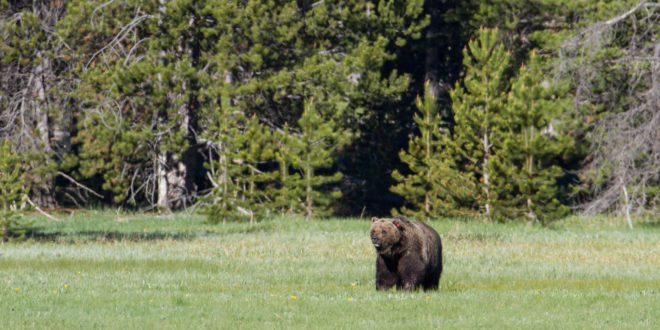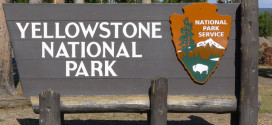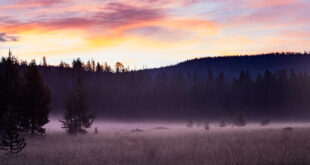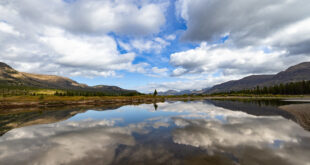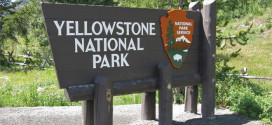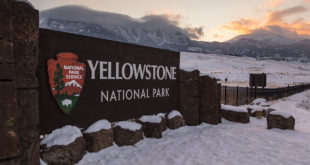Tribal and conservation interests have announced they will sue the U.S. Fish and Wildlife Service over its decision to delist Yellowstone grizzly bears.
According to a Center for Biological Diversity press release, the coalition sent “formal notice of its intent” and will sue after the mandatory 60-day waiting period if the decision is not reversed.
Last week, we reported the USFWS had recommended Yellowstone grizzlies be removed from the Endangered Species List, which would entail the removal of all their federal protections and move management duties over to the states of Montana, Wyoming, and Idaho.
Each state has pledged to keep the grizzly population above at least 600; currently, the Yellowstone grizzly population is estimated at around 700. However, each state has expressed interest in a trophy hunting season.
Management safeguards, including a shut-down of all hunting, would kick in if the population falls below 600, but environmental organizations argue the plan is reckless since it doesn’t factor in the possibility of accidental grizzly deaths.
At the time, several organizations (including the Western Environmental Law Center) announced their intent to sue, following the 60-day waiting period.
Other organizations, including some government agencies, hailed the decision as a success for the Endangered Species List. Indeed, Yellowstone grizzlies were at an all-time low of about 150 bears when they were first put on the list in 1975 and have grown since.
However, the coalition, according to the press release, allege the USFWS is not adequately considering the bear’s future and is seeking delisting for unnecessary reasons:
The Fish and Wildlife Service’s decision comes despite a recent increase in grizzly bear deaths in the Yellowstone region in conjunction with the bears’ documented shift to a meat-focused diet following the demise of one of their key food sources — the seeds of whitebark pine — due to climate change. Federal biologists documented a record-high 61 grizzly deaths in 2015 and 58 in 2016, with the majority of those caused by people. Among other concerns, the final decision also fails to include measures to encourage connectivity between Greater Yellowstone Ecosystem and Crown of the Continent ecosystem grizzlies, leaving the Yellowstone bears in what is essentially an isolated island population.
“With grizzly deaths spiking, now is not the time to declare the great bear recovered and federal protections unnecessary,” said Earthjustice attorney Timothy Preso. “The grizzly is a major part of what makes the region in and around Yellowstone National Park so special and unique. We should not be taking a gamble with the grizzly’s future.”
Earthjustice is representing the Northern Cheyenne Tribe, Center for Biological Diversity, National Parks Conservation Association and Sierra Club in issuing a 60-day notice of intent to sue over the decision, and will initiate a lawsuit unless the agency takes action to protect the grizzly bear as the Endangered Species Act requires. The coalition’s notice takes issue with the Service’s evaluation of the mortality consequences of the bears’ meat-based diet and faults the agency for surgically delisting the isolated Yellowstone grizzly population instead of focusing on a broader, more durable grizzly recovery in the West.
“The rule removing federal protections for America’s beloved Yellowstone grizzly bears is a political decision that is deeply flawed and will reverse so much of the progress that has been made to recover these bears,” said Andrea Santarsiere, a senior attorney with the Center for Biological Diversity. “We are ready to fight to ensure these bears don’t end up dead at the hands of trophy hunters.”
“The decision to prematurely strip grizzly bears of endangered species protections is an affront to tribal nations and their repeated calls for consultation. If allowed to move forward, this decision to once again put politics before science could set grizzly bear recovery back by decades. People and bears can coexist, but only if given the chance,” said Bonnie Rice, Greater Yellowstone representative with Sierra Club’s Our Wild America campaign.
“The stakes are too high to rush removing important protections for Yellowstone grizzly bears,” said Stephanie Adams, Yellowstone program manager for National Parks Conservation Association. “The process has been fraught and common sense concerns have been ignored. There’s no legally binding agreement to prevent hunting within the National Park Service-managed John D. Rockefeller Parkway. This and other issues raised by the National Park Service, the agency responsible for managing the core of the grizzly population in Yellowstone and Grand Teton, have been ignored in the final rule.”
This is not the first time Yellowstone grizzlies have been delisted. They were taken off the list in 2007, but protections were reinstated in 2009 when a federal judge ruled the Service had ignored the impacts of whitebark pine loss on grizzly foraging habits. In their ruling, the 9th Circuit Court of Appeals chastised the USFWS, saying, “the Service cannot take a full-speed ahead, damn-the-torpedoes approach to delisting — especially given the ESA’s ‘policy of institutionalized caution.’”
 Yellowstone Insider Your Complete Guide to America's First National Park
Yellowstone Insider Your Complete Guide to America's First National Park
